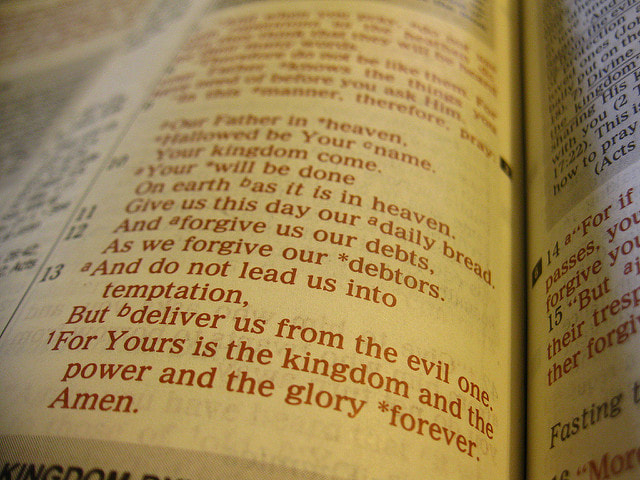|
Matthew 6:7-15 (NRSVCE) “When you are praying, do not heap up empty phrases as the Gentiles do; for they think that they will be heard because of their many words. Do not be like them, for your Father knows what you need before you ask him. “Pray then in this way: Our Father in heaven, hallowed be your name. Your kingdom come. Your will be done, on earth as it is in heaven. Give us this day our daily bread. And forgive us our debts, as we also have forgiven our debtors. And do not bring us to the time of trial, but rescue us from the evil one. For if you forgive others their trespasses, your heavenly Father will also forgive you; but if you do not forgive others, neither will your Father forgive your trespasses. This passage has always intrigued me. You will often hear people take the first section as a prooftext that using written prayers, or reusing prayers at all, is not pleasing to God. It’s just heaping up “empty phrases as the Gentiles do”, after all. We look at that section and we may think that every prayer we give needs to be spontaneous! It needs to be personal! We need to use our own words, or else it’s not really a prayer! Or if you have no words of your own, don’t use any words, because “your Father knows what you need before you ask him.” How can you possibly establish a relationship with God if you use someone else’s words? The point is, don’t reuse prayers.
But immediately after saying that, Jesus gives us a prayer. The one prayer that we all know and love: the Our Father. Why is this prayer okay to reuse, but others aren’t? Is it just because Jesus said it? No, it’s that we misunderstood the point Jesus was making in the first place. It’s not that old prayers are somehow worse, or that new prayers are somehow better. It’s about your disposition in prayer. What are you searching for when you pray? The pagans Jesus is talking about knew how to string together the right words with just enough flourish and pomp to impress everyone with how pious they were, or perhaps to impress their gods. Perhaps they thought that if they could prove to the gods how pious they were, the gods would listen! But the prayer that Jesus gives us is not impressive at all. It’s humble. It admits our faults, begs forgiveness, and promises that we will do better. More importantly, it acknowledges that our God is not a bogeyman, like the gods of the pagans. The pagans worked to impress their gods, so that the gods might do their bidding. Their gods were invoked with pomp, with ritual, and with magic, all for the sake of fulfilling the will of men. With the Our Father prayer, we acknowledge that it is about God’s will, not our own. We acknowledge that our will ought to be conformed to the will of the Father, “For if you forgive others their trespasses, your heavenly Father will also forgive you”. The real question Jesus is raising here is: Who is the object of your prayer? Is it yourselves? Then you are no better than the pagans. The object of your prayer ought to be God, for it is from Him that everything is received, and to Him everything is due. Whether you are reciting the Our Father, saying a prayer of your own, or even pulling from the vast trove of prayers left to us by the many Christians throughout the ages, it doesn't matter. What matters is your disposition. Are you orienting yourself toward God in your prayer, or toward yourself? |
ArchivesCategories
All
|

 RSS Feed
RSS Feed